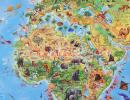Personalities. Mikhail III Fedorovich Roman Yurievich Zakharyin Koshkin
birth: 12 November 1553, Moscow Russian kingdom, Title: prince
profession: 1586, Nizhny Novgorod, Russian kingdom, Viceroy of Nizhny Novgorod
title: 1586, Moscow, Russian kingdom, boyar
marriage : Aksinya Ivanovna Shastunova (Romanova) , Moscow, Russian kingdom
place of residence: 1598, Moscow, Russian kingdom, After the death of Fyodor Ioannovich, he was considered a possible rival of Boris Godunov in the struggle for power
place of residence: 1600, Arkhangelsk, Russian kingdom, Exiled along with other Romanovs, who fell into disgrace under Boris Godunov, who viewed them as his rivals in claims to the throne of Moscow
place of residence: 1601, Antoniev-Siysky monastery, Arkhangelsk province, Russian kingdom, He and his wife Xenia Ivanovna Shestova were forcibly tonsured monks under the names "Filaret" and "Martha", which should have deprived them of their rights to the throne. The Holy Trinity Anthony-Siysky Monastery is located 160 km from Arkhangelsk, in the Kholmogorsky district, on a peninsula in the Big Mikhailovsky Lake. From this lake flows the river Siya (a tributary of the Dvina), which gave the name of the monastery
profession: 1605, Rostov, Russian kingdom, Released by False Dmitry I as a "relative" from the Anthony-Siya Monastery and occupied an important church post, Metropolitan of Rostov, Filaret remained in it under Vasily Shuisky
profession: June 1608, Tushino, Moscow province, Russian kingdom, Captured by the Tushins in Rostov and adopted by False Dmitry II as a "relative". Forced to play the role of "betrothed patriarch" in the Tushino camp of the new impostor; before the enemies of the impostor, he presented himself as his "prisoner" and did not insist on his patriarchal dignity
profession: March 1610, Recaptured from Tushino captivity, was soon appointed to the embassy to Sigismund III
profession: 1611, Smolensk, Russian kingdom, He did not object to the election of the Polish prince Vladislav Sigismundovich as king, but demanded that he accept Orthodoxy. Participating in negotiations with Vladislav's father, Polish king Sigismund III near Smolensk and refusing to sign the final version of the treaty prepared by the Polish side, was arrested by the Poles
...: 1613, Moscow, Russian kingdom, The only surviving son, Mikhail Fedorovich, was elected Russian Tsar
place of residence: June 1, 1619, He was released from Polish captivity (in the order of an exchange of prisoners) in accordance with the terms of the Deulino truce of 1618 and was solemnly greeted by his son
place of residence: June 14, 1619, Moscow, Russian kingdom, Arrived in Moscow
title: from 24 June 1619 - 1633, Moscow, Tsardom of Russia, Patriarch of Moscow and All Russia. His enthronement by the order of the appointment of the first Moscow Patriarch was performed by the Jerusalem Patriarch Theophan III, who was in Moscow. Being the parent of the sovereign, until the end of his life he was officially his co-ruler. Used the title "Great Sovereign" and actually led Moscow politics
death: 1 October 1633, Moscow
Roman Yurievich Zakharyin-Koshkin(d. February 16) - okolnichiy and voivode, ancestor of the Romanovs, son of the boyar Yuri Zakharyevich Koshkin. Father of the first wife of Ivan the Terrible Anastasia Romanovna Zakharyina and Nikita Zakharyin - the founder of the dynasty Romanovs, grandfather of Tsar Fyodor Ivanovich and Fyodor Nikitich - Patriarch Filaret.
Biography
Information about his life is very scarce. According to some sources, he had the rank of roundabout. Roman is mentioned in the ranks as a governor in 1532 and in 1535. In the future, he did not receive appointments. Roman died on February 16, 1543. He was buried in a family crypt in the basement of the Transfiguration Cathedral of the Novospassky Monastery. Studies of the skeleton of Roman Yuryevich showed that he had a height of 178-183 cm and suffered from Paget's disease (a pathological process of the skeletal system caused by a violation of intraosseous metabolism). A. B. Shirokorad believes that it was precisely because of illness after 1535 that Roman dropped out of service.
According to the preserved skull, a drawing was made that restores the appearance.
From his father, Roman inherited a wooden tower, which was located next to the church of St. George on Dmitrovka.
Marriage and children
According to some assumptions, Roman was married twice (the name of his first wife is unknown, or she did not exist). The mother of his daughter, the future queen, was called Juliania (Ulyana) Feodorovna, in monasticism Anastasia (her surname is not indicated in the genealogies). Whether Ulyana was the mother of all five of his known children is unclear - according to some assumptions, only the last Anastasia. Children:
Write a review on the article "Roman Yuryevich Zakharyin"
Comments
Notes
Literature
- Veselovsky S. B. Rod Mares // Research on the history of the class of service landowners. - M .: Nauka, 1969. - 584 p. - 4500 copies.
- Zimin A. A. . Formation of the boyar aristocracy in Russia in the second half of the 15th - the first third of the 16th century. - M .: Nauka, 1988. - 350 p. - 16,000 copies. - ISBN 5-02-009407-2.
- Shirokorad A. B. Path to the throne. - M .: AST, Astrel, 2004. - 452 p. - ISBN 5-17-024340-5, ISBN 5-271-09276-3.
- History of the genera of the Russian nobility: In 2 books. / aut.-stat. P. N. Petrov. - M.: Sovremennik; Vocabulary, 1991. - Vol. 1. - 431 p. - 50,000 copies. - ISBN 5-270-01513-7.
- Pchelov E.V. Romanovs. History of the dynasty. - M .: OLMA-PRESS, 2003. - 494 p. - ISBN 5-224-01678-9.
An excerpt characterizing Roman Yuryevich Zakharyin
“It must be very interesting,” Desalles said. - The prince is able to know ...– Ah, very interesting! said m lle Bourienne.
“Go and bring it to me,” the old prince turned to m lle Bourienne. - You know, on a small paperweight table.
M lle Bourienne jumped up happily.
“Oh no,” he yelled, frowning. - Come on, Mikhail Ivanovich.
Mikhail Ivanovich got up and went into the study. But as soon as he left, the old prince, looking around uneasily, threw down his napkin and went himself.
“They don’t know how to do anything, they mix everything up.
While he was walking, Princess Mary, Dessalles, m lle Bourienne and even Nikolushka looked at each other in silence. The old prince returned with a hasty step, accompanied by Mikhail Ivanovich, with a letter and a plan, which he, not allowing anyone to read during dinner, put beside him.
Going into the living room, he handed the letter to Princess Marya and, laying out before him the plan of the new building, on which he fixed his eyes, ordered her to read it aloud. After reading the letter, Princess Mary looked inquiringly at her father.
He stared at the plan, apparently deep in thought.
- What do you think about it, prince? Desalle allowed himself to ask a question.
- I! I! .. - as if unpleasantly waking up, said the prince, not taking his eyes off the plan of construction.
- It is quite possible that the theater of war will come so close to us ...
– Ha ha ha! Theater of War! - said the prince. - I said and I say that the theater of war is Poland, and the enemy will never penetrate further than the Neman.
Desalles looked with surprise at the prince, who was talking about the Neman when the enemy was already at the Dnieper; but Princess Mary, who had forgotten geographical position Nemana thought that what her father was saying was true.
- When the snow grows, they will drown in the swamps of Poland. They just can’t see,” the prince said, apparently thinking about the campaign of 1807, which, as it seemed, was so recent. - Benigsen should have entered Prussia earlier, things would have taken a different turn ...
“But, prince,” Desalles said timidly, “the letter speaks of Vitebsk…
“Ah, in a letter, yes ...” the prince said displeasedly, “yes ... yes ...” His face suddenly assumed a gloomy expression. He paused. - Yes, he writes, the French are defeated, at what river is this?
Dessal lowered his eyes.
“The prince does not write anything about this,” he said quietly.
- Doesn't he write? Well, I didn't invent it myself. Everyone was silent for a long time.
“Yes ... yes ... Well, Mikhail Ivanovich,” he suddenly said, raising his head and pointing to the construction plan, “tell me how you want to remake it ...
Mikhail Ivanovich approached the plan, and the prince, after talking with him about the plan for a new building, glancing angrily at Princess Marya and Desalle, went to his room.
Princess Mary saw Dessal's embarrassed and surprised look fixed on her father, noticed his silence and was amazed that the father had forgotten his son's letter on the table in the living room; but she was afraid not only to speak and question Dessalles about the reason for his embarrassment and silence, but she was afraid to even think about it.
In the evening, Mikhail Ivanovich, sent from the prince, came to Princess Mary for a letter from Prince Andrei, which had been forgotten in the drawing room. Princess Mary submitted a letter. Although it was unpleasant for her, she allowed herself to ask Mikhail Ivanovich what her father was doing.
“Everyone is busy,” Mikhail Ivanovich said with a respectfully mocking smile that made Princess Marya turn pale. “They are very worried about the new building. We read a little, and now,” said Mikhail Ivanovich, lowering his voice, “at the bureau, they must have taken care of the will. (Recently, one of the prince's favorite activities was to work on papers that were supposed to remain after his death and which he called a will.)
- And Alpatych is sent to Smolensk? asked Princess Mary.
- How about, he has been waiting for a long time.
When Mikhail Ivanovich returned with the letter to his study, the prince, wearing spectacles, with a lampshade over his eyes and a candle, was sitting by the open bureau, with papers in his hand held far back, and in a somewhat solemn pose read his papers (remarks, as he called them), which were to be delivered to the sovereign after his death.
When Mikhail Ivanovich entered, he had tears in his eyes of recollection of the time when he wrote what he was reading now. He took the letter from Mikhail Ivanovich's hands, put it in his pocket, packed the papers and called Alpatych, who had been waiting for a long time.
On a piece of paper he had written down what was needed in Smolensk, and he, walking around the room past Alpatych, who was waiting at the door, began to give orders.
- First, postal paper, you hear, eight ten, here's the model; gold-edged ... a sample, so that it would certainly be according to it; varnish, sealing wax - according to a note from Mikhail Ivanych.
He walked around the room and looked at the memo.
- Then the governor personally give a letter about the record.
Later, latches were needed for the doors of the new building, certainly of such a style that the prince himself invented. Then a binding box had to be ordered for laying the will.
Giving orders to Alpatych lasted more than two hours. The prince did not let him go. He sat down, thought, and, closing his eyes, dozed off. Alpatych stirred.
- Well, go, go; If you need anything, I'll send it.
Alpatych left. The prince again went up to the bureau, looked into it, touched his papers with his hand, locked them again, and sat down at the table to write a letter to the governor.
Zakharyin, Roman Yurievich
roundabout, † 1543
- - Grigory Antonovich, therapist, founder of the clinical school, professor at Moscow University, honorary member of the St. Petersburg Academy of Sciences. Author of widely acclaimed clinical lectures...
Russian encyclopedia
- - boyar 1547 ...
- - okolnichiy 1514, boyar 1521 ...
Big biographical encyclopedia
- - comp. accounting course...
Big biographical encyclopedia
- - Poet and historian OK. 1750, † 1800...
Big biographical encyclopedia
-
Big biographical encyclopedia
- - cm....
Big biographical encyclopedia
- - Professor of the Department of Mining Machines and Equipment of the Moscow State Mining University, Scientific Supervisor of the Engineering Center of the Moscow State Mining University...
Big biographical encyclopedia
- - great-great-great-grandfather of Tsar Mikhail, boyar of the Grand Duke Basil III. He was a military governor in campaigns near Smolensk and Kazan, as an overseer of "the whole outfit" ...
Biographical Dictionary
- - Zakharyin - translator of the end of the 18th century. - From his translations are known: "Descriptions of the stay in Mitava of the famous Cagliostra in 1779 and the magical actions performed by him there", the works of Charlotte von der Recke ...
Biographical Dictionary
- - Chairman of the Board of JSC "Stock Exchange" Russian Trading System "...
Financial vocabulary
- - part of the Russian coast of the North. ocean to the west from the mouth of the Pechora ...
- - translator of the end of the XVIII century. - From his translations are known: "Descriptions of the stay in Mitava of the famous Cagliostra in 1779 and the magical actions he performed there", Op. Charlotte von der Reke...
encyclopedic Dictionary Brockhaus and Euphron
- - was also written by Koshkin-Zakharyin-Yuriev ...
Encyclopedic Dictionary of Brockhaus and Euphron
- - Grigory Antonovich, Russian therapist. In 1852 he graduated from the medical faculty of Moscow University...
Great Soviet Encyclopedia
- - Grigory Antonovich, doctor, one of the founders of the domestic clinic of internal diseases, founder of the Moscow therapeutic school, which developed the empirical direction in medicine ...
Modern Encyclopedia
"Zakharyin, Roman Yurievich" in books
author Anokhin Petr KuzmichEffect of starvation on the activity of enzymes of the pentose phosphate pathway in the liver and brain of rats Yu. L. Zakharyin (Moscow)
From the book Problems of therapeutic starvation. Clinical and experimental studies [all four parts!] author Anokhin Petr KuzmichEffect of starvation on the activity of enzymes of the pentose phosphate pathway in the liver and brain of rats Yu. L. Zakharyin (Moscow) last years in the clinic is often used for therapeutic purposes, in particular, for the treatment of mental illness, complete fasting. There is no doubt that
Why the novel "Anna Karenina" is not only a family romance
From the book of Leo Tolstoy author Shklovsky Viktor BorisovichZakharyin Grigory Antonovich (1829–1897)
From the book Path to Chekhov author Gromov Mikhail PetrovichProfessor Zakharyin
From the book, Konstantin Korovin recalls ... author Korovin Konstantin AlekseevichProfessor Zakharyin Moscow. The month of April. Through the window, from my wooden house in Sushchevo, by a large garden, I see fences, acacias, lindens and a cheerful green fence of the owner's mansion, whose windows overlook the street. In the yard there is a large stable with a yellow roof and a carriage house.
3. The image of the author and the genre (novel-tale "Squirrel", novel-parable "Father-Forest" by A. Kim)
From the book Russian natural-philosophical prose of the second half of the twentieth century: tutorial author Smirnova Alfiya Islamovna3. The image of the author and the genre (the novel-fairy tale "Squirrel", the novel-parable "Father-Forest" by A. Kim) one of the characters in the story. These are
Zakharyin (1829–1897)
From the book of 100 great doctors author Shoifet Mikhail SemyonovichZakharyin (1829–1897) Grigory Antonovich Zakharyin, head of the Department of Faculty Therapy at Moscow University, noted many eccentricities that were attributed to his chronic illness. He was seriously ill with sciatica (neuritis of the sciatic nerve), which often
Zakharyin
From the book Encyclopedic Dictionary (E-Y) author Brockhaus F. A.Zakharyin Zakharyin (Grigory Antonovich) - Honored Professor and Director of the Faculty Therapeutic Clinic, Moscow. univ., honorary member of the Academy of Sciences, b. in 1829, entered the Moscow Univ. in 1847, where he completed the course as a doctoral student in 1852. Upon completion of the course, he was appointed
Zakharyin Grigory Antonovich
From the book Big Soviet Encyclopedia(FOR) the author TSBDOCTOR ZAKHARYIN
From the book Cannon Street, 9 author Belitsky Yakov MironovichRoman Yurievich Kravtsov Home computer
From the book Home Computer the author Kravtsov RomanRoman Yurievich Kravtsov Home computer
Chapter Four NOVEL IN NOVEL ("Gift"): NOVEL AS "MOBIUS RIBBON"
From the book "Matryoshka Texts" by Vladimir Nabokov author Davydov Sergey SergeevichChapter Four NOVEL IN A NOVEL (“THE GIFT”): A NOVEMBER AS A “MOBIUS RIBBON” Shortly before the release of The Gift, the last of Nabokov's novels of the “Russian” period, V. Khodasevich, who regularly spoke about Nabokov's works, wrote: I, however, I think I'm even almost sure that
The paranoid novel of Andrei Bely and the "tragedy novel"
From the author's bookThe paranoid novel of Andrei Bely and the "tragedy novel" In his response to Petersburg, Vyach. Ivanov complains about "the too frequent abuse of Dostoevsky's external methods, with the impotence to master his style and penetrate into the essence of things in his sacred ways."
CHAPTER IX. NOVEL FROM PEOPLE'S LIFE. ETHNOGRAPHIC NOVEL (L. M. Lotman)
From the book History of the Russian Novel. Volume 2 author Philology Team of authors --CHAPTER IX. NOVEL FROM PEOPLE'S LIFE. ETHNOGRAPHIC NOVEL (L. M. Lotman)
36. G. A. Zakharyin, his contribution to therapy
From the book History of Medicine the author Bachilo E V36. G. A. Zakharyin, his contribution to therapy Grigory Antonovich Zakharyin (1829–1897) is one of the leading clinicians of the 19th century. He graduated from the medical faculty of Moscow University in 1852. From 1862 to 1895. G. A. Zakharyin was the head of the faculty therapeutic clinic
Roman Yurievich Zakharyin-Yuryev
Roman Yuryevich Zakhariev-Yuriev (died 1543).
Okolnichiy, was governor in the campaign of 1531. He had several sons and a daughter, Anastasia, who in 1547 became the wife of Tsar John IV Vasilyevich the Terrible. From that time on, the rise of the Zakharyin family began. Nikita Romanovich Zakharyin-Romanov (d. 1587) - grandfather of the first tsar from the house of the Romanovs, Mikhail Fedorovich, boyar (1562), participant in the Swedish campaign of 1551, active participant Livonian War. After the death of Tsar Ivan IV the Terrible, as the closest relative - the uncle of Tsar Fyodor Ivanovich, he headed the regency council (until the end of 1584). He accepted monasticism with the estate of Nifont.
Fedor Nikitich Romanov
Fyodor Nikitich Romanov (1553-1633).
In monasticism Filaret, Russian political figure, patriarch (1619), father of the first tsar from the Romanov dynasty.
Mikhail III Fedorovich
Mikhail III Fedorovich (07/12/1596 - 02/13/1645).
The first Russian tsar from the Romanov dynasty (ruled from March 24, 1613), was elected to reign by the Zemsky Sobor on February 21 (March 3), 1613, which closed the Time of Troubles. The son of the boyar Fyodor Nikitich Romanov (later - Patriarch of Moscow Filaret) and the noblewoman Xenia Ivanovna Romanova (nee Shestova). He was a cousin-nephew of the last Russian tsar from the Moscow branch of the Rurik dynasty, Fedor I Ioannovich.
Mikhail Fedorovich, together with his parents, fell into disgrace under Boris Godunov and in June 1601, was exiled with his aunts to Beloozero, where he lived until the end of 1602. In 1603, he was transferred to the city of Klin, Kostroma province. Under False Dmitry I, he lived with his mother in Rostov, from 1608, with the rank of steward. He was a prisoner of the Poles in the Kremlin besieged by the Russians.
Weak as a person and in poor health, Mikhail Fedorovich could not independently manage the state, initially he was led by his mother - the nun Martha - and her relatives Saltykov, then from 1619 to 1633 his father - Patriarch Filaret.
In February 1617, a peace treaty between Russia and Sweden was concluded. In 1618, the Deulino truce was concluded with Poland. In 1621, Mikhail Fedorovich issued the “Charter of Military Affairs”, in 1628, he arranged the first Nitsinsky in Russia (Turinsky district of the Tobolsk province). In 1629, an employment contract was concluded with France. In 1632, Mikhail Fedorovich resumed the war with Poland and was successful; in 1632, he formed the order of the Collection of military and sufficient people.
In 1634, the war with Poland ended. In 1637, he directed that criminals be branded and that pregnant criminals not be executed until six weeks after giving birth.
A 10-year term was set for the investigation of fugitive peasants. The number of orders was increased, the number of clerks and their importance increased. Intensive construction of serif lines against Crimean Tatars. There was a further development of Siberia.
Tsar Michael was married twice:
- 1) on Princess Maria Vladimirovna Dolgoruky;
- 2) on Evdokia Lukyanovna Streshneva.
From the first marriage there were no children, and from the second there were 3 sons, including the future Tsar Alexei and seven daughters.






